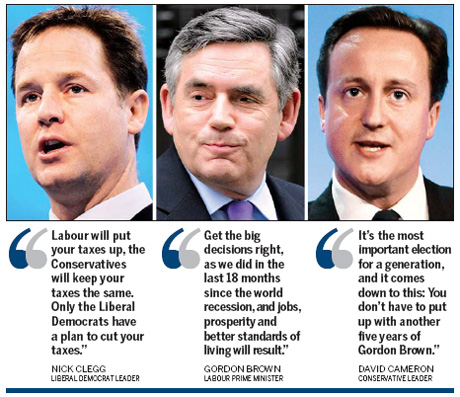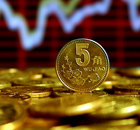Global General
UK's Brown calls for May 6 vote
(China Daily)
Updated: 2010-04-07 08:41
 |
Large Medium Small |
Experts say outcome tough to predict as Conservatives see their appeal slide
BEIJING - British Prime Minister Gordon Brown fired the starting gun on Tuesday for what could be the closest general election contest for a generation.

Until recently, it looked likely the main opposition Conservative party led by fresh-faced 43-year-old David Cameron would romp home to victory.
But in recent months the opinion polls have narrowed and the result is now far from certain.
At the election, now set for May 6, Brown will be defending what was a 66-seat majority won by Tony Blair when he led Labour to victory in 2005, though this has been whittled away since by the attrition of lost by-elections when individual MPs died or resigned.
To secure the necessary 326 seats for an overall majority, the Conservatives need to take 116 seats from Labour and the Liberal Democrats, the third party. The latest Guardian/ICM opinion poll suggests they could end up short of that target with the Tory lead only 4 percent.
The battle will be won or lost in key marginal seats where the Conservatives have spent millions, thanks to their controversial backer Lord Ashcroft, an international tax exile businessman with Belizean nationality. There the Conservatives are said to be doing better than in national polls.
Seasoned observers still expect Cameron to somehow scramble past the winning post, even though the way the seats are currently distributed is biased against his party.
Whether he does or not, the election is set to be not only the closest since former Conservative prime minister John Major won a surprise majority of 21 in 1992, but the first hung parliament (one where no party has overall control) since February 1974, after which Harold Wilson led a minority Labour Government for eight months.
Cameron would then have to lead a government with the co-operation of the Liberal Democrats led by Nick Clegg, also a telegenic 43-year-old, or enter into a formal coalition with them.
The main issue in the election will undoubtedly be the economy. Britain has been hit hard by the economic crisis. The cost of bailing out the banking system (the effective nationalization of one bank, the Royal Bank of Scotland) has sent the national debt spiraling.
Any new government will face a budget deficit of around 180 billion pounds ($274 billion), some 12.8 per cent of GDP, even higher than the 12.7 percent of that of Greece.
This is proving a difficult issue for the Conservatives. They announced tough measures to cut the deficit, thinking that was what the public wanted to hear.
Most Britons are having a good economic crisis, however. They are still working and are enjoying a base interest rate of 0.5 percent, the lowest in history, which has massively eased the burden of mortgage payments for many.
Some election analysts believe the narrowing in the polls reflects the fact they don't want any new government to upset this particular apple cart.
Another issue could be that Cameron might be too posh.
A direct descendant of 19th-century monarch William IV, he is almost more royal than the Queen herself.
He would also be the first Conservative prime minister in 46 years to have gone to a public school (which in Britain means private) and the very top one as well, Eton College.
The 2010 election will be the first in the UK to feature televised debates between the three party leaders, a form that has been a feature in American elections for half a century.
Despite the expected closeness of the result, few expect Labour to hang on to its overall majority.
Just a feather touch swing of 2 percent from Labour to the Conservatives would see them lose nearly 40 seats. They can only afford to lose 23.
The best hope for Brown would be to lead a Labour minority government in some form of partnership with the Liberal Democrats.
That would be quite an achievement after surviving three coup attempts and given the party's dire poll ratings just six months ago.
All the pressure is on Cameron, however. The Conservatives would be badly damaged if they lost four general elections in a row, yet given Britain's economic position, the victor's spoils might be slight indeed.
Andrew Moody is a former House of Commons-based lobby correspondent.
China Daily










